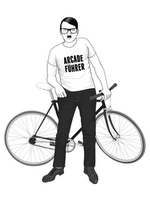
Mit dem Label Hipster Hitler haben die beiden Comiczeichner JC (23 Jahre alt) und APK (22) im Netz bereits für einiges Aufsehen gesorgt. Sie präsentieren Hitler als Hipster, als androgynes fashion victim mit Homo-Attitüde. Ohne Zweifel setzen die beiden ein ganz neues Hitler-Bild in Szene, und meinen damit ausschließlich eine Parodie gemacht zu haben. Ob das gelungen ist, ist diskussionswürdig. Wir haben JC und APK interviewt:
1. What do you want to express by styling Hitler as a Hipster?
The term ‘Hipster’ is hardly a flattering one. It is generally thought that one of the most obvious ways of recognizing a Hipster is that they claim to not be one and hate being called one temselves. The general attitude towards Hipsters is that of (mainly playful) loathing and detestation.
Conceptually, in styling Hitler as a Hipster we’re offering a new way of disliking Hitler and laughing at him by highlighting how detestable a person he was. Through the medium of these anachronistic comics, we’re only reiterating what authors such as Ian Kershaw have argued about Hitler; that he was a “lazy dictator” who was indolent, maniacal at times, with violent bursts of enthusiasm. For example the comic ‘campaign-strategy’ simply satirizes Hitler’s stubborn conviction that he was a good military strategist and would demand that the generals place maps in front of him and would proceed to make largescale military decisions, much to their displeasure. Furthermore, the comic ‘eastern-front’ is directly poking fun at Hitler’s mistake in 1941 where he stopped the advance into Moscow and diverted his assets forces to acquire more farmland in the East in order to fulfill his ambition of a German Empire.
Artistically, it’s a literal re-imagining of Hitler, his expressions, his demeanor and attitude. By drawing him by hand, we are constructing him and imbuing him with a range of negative qualities so as to make him appear contemptuous, pompous, condescending and dismissive towards everyone else.
2. Which similarities do you see between Hitler and the Hipster?
The most striking similarities between Hitler and the stereotype of the Hipster that we are all familiar with are Hitler’s aspirations to be an artist rather than following in the footsteps of his father as a civil servant, the status of ‘failed artist’ that is conferred on him as a result of being rejected from the Vienna Academy of Arts twice, his bohemian lifestyle in Vienna around 1905-1907 when he painted, attended the theatre, read poetry etc and later on his staunch support of animal protection and choice to be vegetarian. Furthermore, some of the anti-capitalist views he harbored, the occasional use of amphetamine which turned into an addiction in his later years, his avoidance of normal sexual relations with women and the resulting speculation around his sexuality all fit well with conceptions and clichés of Hipster culture.
3. In your comic Hitler is crossed with the stereotype of the hipster, who gets satirized by whom?
We draw equal parts from one to satirize the other. Placing a Hipster as the political head of state in a charged settling like World War II goes hand in hand with reimagining a despised figure like Hitler as part of a fairly despised subculture such as Hipsterism. From the point of conception of each comic to the final execution, the jokes are interwoven so that we are not only satirizing Hitler’s thoughts, actions and logic, but also heavily critiquing a contemporary subculture of urban, middle-class youth that fetishize the ‘authentic’ and conform to non-conformism.
4. In your comic Hitler is shown in a modern, juvenile way – behaving like a lot of young people – do you see any risk that young people reading your comics may identify with your Hitler and may not differentiate between the persiflage and the historical Hitler?
We’ve always been clear that there is nothing we wish to celebrate about Hitler as being hip through this comic. In our satire of Hipster culture we are painting the subculture as a terribly flawed one and never worth subscribing to. In placing Hitler at the center of such a joke, we don’t see the comic as inviting readers to relate to Hitler but rather explicitly ridicule him, laughing at him and not with him. We’re neither trying to belittle nor erase from people’s memories the terrible atrocities committed by Hitler. We strongly believe that those crimes against humanity will not be forgotten. We see our work as part of an Aristotelian idea of comedy as being cathartic wherein the prosperity and downfall of a ridiculous character produces and purges the feeling of indignation.
5. Is your comic drawn for a specific audience?
Our comic is mainly aimed at young men and women under the age of 35 who are familiar with contemporary sub-cultures but who do have some knowledge of World War II history be it from high school and/or University or personal reading and are familiar with the characters and events of the period.
6. Is thumbing serious discussion of NS-history a form of tabooing that evokes provocative or ironical use of it?
We think discussing Nazi history through comedy evokes in the audience the opposite response of tragic pity or fear.
7. What is the contribution made by your comic regarding maintenance of a critical awareness of NS-history?
The jokes and the humor in this comic is written largely around the interactions between the highly exaggerated personalities of Hitler, Goebbels, Göring, Rommel, Himmler, Stalin, Churchill and Mussolini. Given that Nazi Germany was under the dictatorship of one individual, Hitler, our choice to disregard the social and political factors within the state and focus solely on the people in power, their personal motivations, private fears, ambitions, aspirations and annoyances only highlights the importance of understanding the personas of this particular period in history.
8. Would you say that by your comic the NS-history gets trivialized?
A favorite quote shared between both authors is that of Henry Ford, who said “History is more or less bunk.” We both share the belief that History is not about providing answers but rather, raising questions. The research behind quite a few of our comics delves into the biographies of these personas and spans across a range of facts, theories and urban myths that surround the time. We don’t see our comic as trivializing the events and operations of Nazi Germany but rather bringing to the forefront and questioning the whims and fancies of a few men in whose hands a lot of power was concentrated during the time.
9. Would you say that in the art scene NS-history is kind of “hip” because of its provocative potential?
It’s insulting to art, history and the victims of World War II on both sides to say that the use of Nazi history is ‘hip’ in art because of its potential to be provocative. This period of history has been one of the most important turning points in modern history that has caused waves of repercussions on entire systems of thoughts, industries and societies thus opening it up to be approached from innumerable perspectives. Perhaps it’s not the actually subject matter that Art is so interested in, but the changing relation we hold towards this shared history, with the passage of time and generations that prompt it to constantly resurface on the art scene.
10. What is the task of art in general; should there be any limits in using political subjects?
It’s hard to really answer a loaded question such as ‘What is the task of art in general?’ We don’t consider ourselves in any way an authority on this matter and would proceed with caution in answering it but would like to say that at least since Marcel Duchamp’s Fountain, the task of art is to ask that very question.
If there were limits to the use of political subjects in Art, it would turn communication into a weapon in information warfare and propaganda by restricting it to the hands of a few.
11. Would you say that an artist who deals with NS-history as subject, should clarify his own political attitude throughout his art?
Art can serve many functions with respect to the political, the social etc that go beyond the personal. It really depends on the Art itself, the purpose with which it is made, the execution of it and to whom it is being exhibited, but we don’t think that artists are necessarily obligated to clarify their political attitude by default simply because the subject matter of their art is Nazi history.
12. Who are JC + APK?
We are two friends who met studying together at the same University. We always vowed that we would start a comic together if we came up with what we considering a good idea. This was it.
13. Which cultural background are you from and what’s your age?
JC is from Australia (now living in New York) and he is 23 years old while APK is from India (soon moving to New York) and she is 22 years old.
Zur Website von Hipster Hitler: http://hipsterhitler.com

